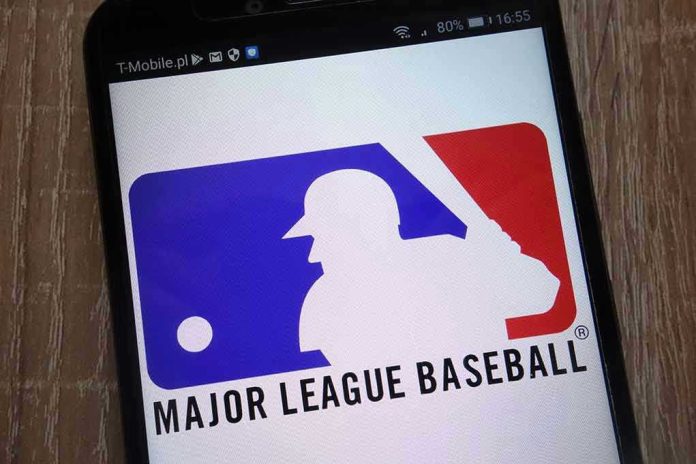
MLB’s unprecedented betting crackdown exposes how woke-era gambling excesses and lack of common-sense oversight nearly shattered America’s pastime—now, the league scrambles to restore trust and prevent future manipulation.
Story Snapshot
- MLB caps individual pitch bets at $200 and bans them from parlays after Cleveland pitchers face federal bribery charges.
- Scandal reveals vulnerabilities in micro-betting markets, raising concerns about sports integrity and regulatory failures.
- Players allegedly helped foreign bettors profit by manipulating pitch outcomes, shaking public confidence in the game.
- Experts warn that quick fixes may not address deeper risks as the league and sportsbooks face mounting scrutiny.
Federal Indictments Expose Threats to Integrity
Federal prosecutors unsealed indictments against Cleveland Guardians pitchers Emmanuel Clase and Luis Ortiz, alleging both accepted bribes to manipulate pitch outcomes and enable foreign bettors to profit illegally. MLB detected unusual betting activity from April to June 2025, launching a rapid investigation.
By November, Ortiz was arrested and appeared in a Boston federal court, while Clase’s whereabouts remained uncertain. Both players deny wrongdoing and remain on paid leave. The scandal has sent shockwaves through the baseball world, calling into question the security of micro-betting markets and the league’s oversight capabilities.
The accusations highlight a critical vulnerability: micro-betting—where fans wager on individual pitches or plays—creates opportunities for manipulation by a single player. This incident is the first time active MLB players have faced federal criminal charges for allegedly rigging single-pitch outcomes.
The Department of Justice asserts that the players’ actions helped Dominican Republic-based bettors win at least $460,000. The MLB’s own integrity unit, in cooperation with major sportsbooks like DraftKings and FanDuel, responded by capping pitch bets and banning them from parlays, aiming to reduce the incentive for corrupt activity.
Critics argue that such micro-bets were a byproduct of the previous administration’s laissez-faire approach, prioritizing revenue over responsibility.
League and Sportsbooks Scramble to Limit Damage
MLB’s new policy—limiting individual pitch bets to $200 and banning their inclusion in multi-bet parlays—reflects the league’s urgent effort to restore public trust. The agreement, which took effect across almost all U.S. sportsbooks, was announced the day after Ortiz’s court appearance.
MLB officials stated that restricting payouts and preventing parlay combinations will help deter manipulation of single-pitch events. Senior sportsbook executives echoed these concerns, emphasizing their commitment to regulatory compliance and the need to rebuild consumer confidence after the scandal.
This coordinated crackdown marks the first time a major U.S. sports league has enacted such sweeping restrictions in direct response to a high-profile integrity breach.
Sports integrity experts and law enforcement have long warned that micro-betting markets are particularly susceptible to abuse, as outcomes hinge on the actions of one player. This vulnerability became a reality in the current scandal, prompting calls for stricter monitoring and cross-jurisdictional cooperation.
The Department of Justice underscored that corruption taints not just athletes, but the public’s faith in a cherished American institution. Meanwhile, Ortiz’s attorney maintains his client’s innocence, warning against overreaction that could punish players before due process runs its course.
Broader Implications: Calls for Accountability and Reform
The fallout from this scandal extends beyond Cleveland or the MLB. The immediate impact includes a reduction in pitch-level betting volume and heightened scrutiny of both player conduct and sportsbook operations.
Fans and teams across the country feel the effects, as faith in the fairness of the sport is shaken. Economically, sportsbooks may lose revenue from restricted betting options, while MLB faces reputational damage and possible financial penalties.
Socially and politically, the case has sparked renewed debates about the risks of legalized gambling, the adequacy of league oversight, and the need for robust integrity safeguards. Some commentators argue that MLB’s cap is necessary but insufficient, suggesting further reforms are needed to protect the game from future manipulation.
While the league’s quick response signals a commitment to upholding integrity, experts caution that such measures may not fully address the underlying risks of micro-betting. Calls for increased transparency, tougher enforcement, and a return to traditional American sporting values are growing louder.
Sources:
MLB, sportsbooks cap bets on individual pitches in response to scandal
Two Cleveland Guardian pitchers Clase, Ortiz indicted rigging single-pitch prop bets




